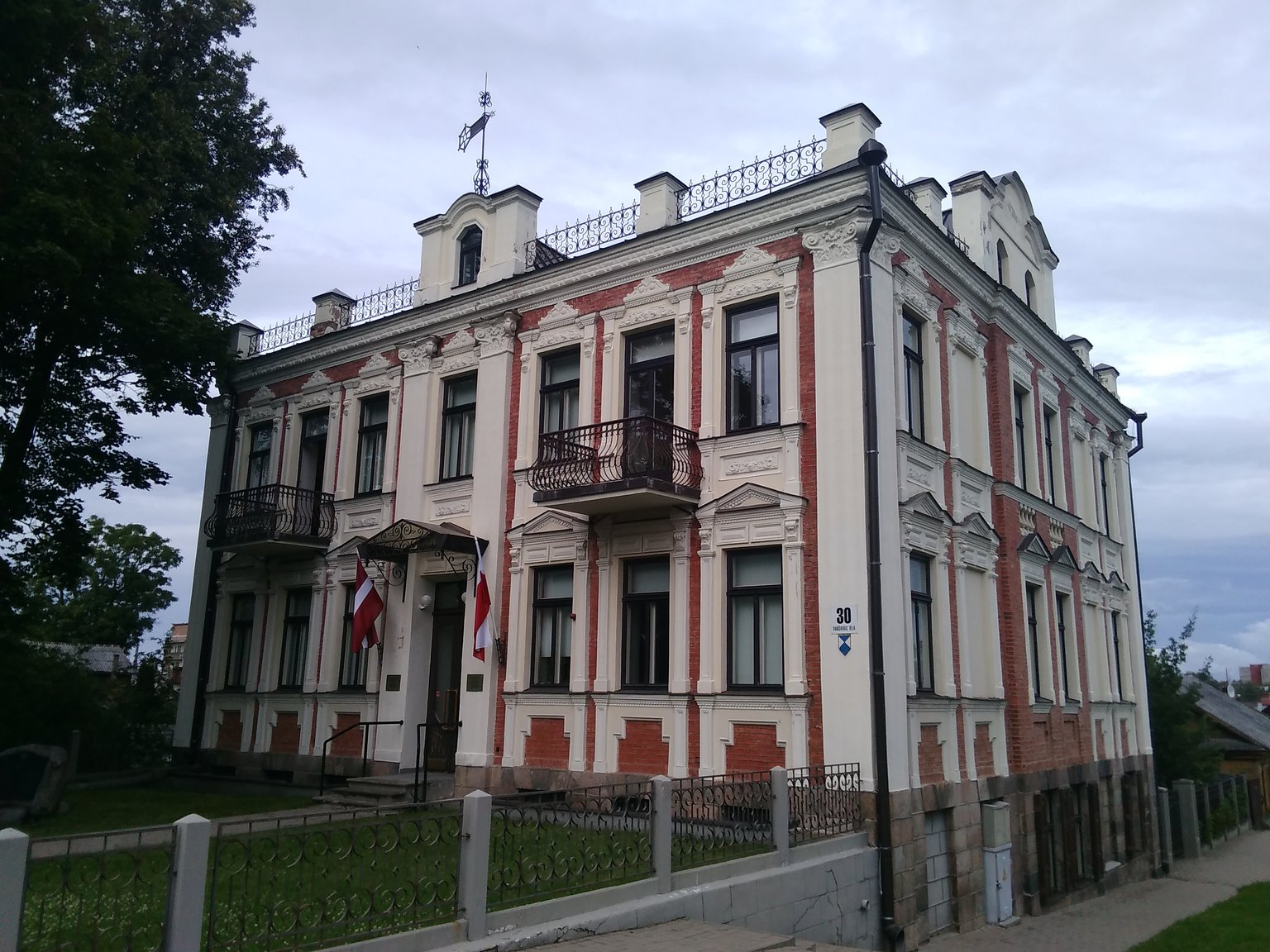Daugavpils Station #4: Polish House. Literally.
The intersection of 18. novembra iela (18th November Street) and Varšavas iela (Warsaw Street) is personally the most defining place for me in the city of Daugavpils. Along the street, there is the Catholic Church of the Immaculate Conception of the Blessed Virgin Mary, a bit closer the Evangelical Cathedral of Martin Luther, and on the other side of the street, the Orthodox Cathedral of Saints Boris and Gleb. Additionally, at the street corner stands the State Polish Gymnasium named after Józef Piłsudski. The name Warsaw Street is not coincidental, as here and in the nearby area, in the New Plan district before World War II, lived the largest Polish community. In post-war and contemporary times, they dispersed throughout the city, but the name remained. Since the 1930s, this area, with a break during wartime and communism, has been the heart of Daugavpils' Polish community. In the building at number 30, right next to the shot tower with its characteristic high tower, is the Polish House - the Center of Polish Culture. The building was purchased around 1930 by local Poles with funds collected in a public fundraiser. During the war, it was taken over by the Soviets and returned to the Poles only in the late 1980s. Today, it serves many important functions, housing the aforementioned Center of Polish Culture and the local branch of the Association of Poles in Latvia "Promień." At the helm of the branch and the entire association* is Mr. Ryszard Stankiewicz as the president.

Polish House - Polish Cultural Center, Daugavpils
The Center of Polish Culture also has its permanent staff, one of them being Svetlana. Most likely, she will be the first person you meet upon entering the Polish House. Although she currently works on fostering Polish culture in Daugavpils and throughout Latvia, her story is complicated yet fascinating. Svetlana, like many of her peers, was born into a family of mixed nationalities – one grandfather was Russian, the other Belarusian, while both grandmothers were Polish. Thanks to this, Svetlana had exposure to our language, but not enough to be fluent. The turning point came during her university years when she chose Polish philology at Daugavpils University, where she acquired fluent proficiency in the Polish language. Simultaneously, while exploring dance and choreography, she met Mrs. Żanna Stankiewicz, the director of the Center of Polish Culture and the leader of the Folk Dance Ensemble "Kukułeczka." Mrs. Stankiewicz proposed that Svetlana become her assistant with the ensemble and collaborate on organizing events within the Center. After some time, a position as a methodologist opened up, and Svetlana accepted it, working there for 11 years. Her responsibilities include organizing cultural events such as exhibitions, festivals, concerts, and competitions for children and youth.
For Svetlana, Polish identity is not limited to her university days and current work. Thinking about her own children, she wanted them to be Polish from an early age, unlike her own experience where the real adventure with Poland began much later. Hence, the decision to send her kids to a Polish kindergarten and later a Polish school. She praises these institutions for their high level of education, a family atmosphere (each teacher knows every child by name), multilingualism (a skill almost essential for living in Daugavpils, introduced early in a young person's life to significantly ease future life), and connection with the church (the school supports Christian upbringing). Through studying in a Polish school and participating in initiatives related to the Center of Polish Culture, children and young people have contact with our country, not only through preserving traditions or practicing the language but also through trips to Poland.
Daugavpils is a multinational and multiethnic city, not only at the neighborhood level but, as Svetlana's story shows, also within families. Complicated identity is not an easy matter, but on the other hand, it is entirely possible to embrace. In the lives of ordinary people, political disputes often take a back seat, as evidenced by the Warsaw Street Festival, held annually in early May. During the colorful, joyful procession of Daugavpils Poles and their guests, greetings come from Russians and Belarusians dressed in their own folk costumes because Warsaw Street is also home to the Center of Russian Culture and the building that housed a Belarusian gymnasium in the interwar period.
Svetlana emphasizes that her work and that of all her colleagues at the Center of Polish Culture is not just an ordinary job that they leave with relief after a certain number of hours. It is a true passion, which, despite occasional obstacles, they carry out with joy, continuously creating a "small Poland" in this specific territory from our point of view. In conclusion, our protagonist invites you to Daugavpils and the welcoming doors of the Polish House, especially during the first days of May, when a variety of festivals, both Polish and Latvian, take place over several days, revealing the city's atmosphere most vividly.
The history of the Polish House is described based on a conversation with President Ryszard Stankiewicz.
*note 2023: The current president of the Association of Poles in Latvia is Peteris Dzalbe, Ryszard Stankiewicz remains the vice-president of the organization.
"Daugavpils station" is a multi-part reportage about the Polish community in eastern Latvia. It was published in 2018 in Polish on my old account @basementdisco. Five years after the premiere, I present versions in English.
Translations assisted by ChatGPT.
Congratulations @brudnopis! You have completed the following achievement on the Hive blockchain And have been rewarded with New badge(s)
Your next target is to reach 6000 upvotes.
You can view your badges on your board and compare yourself to others in the Ranking
If you no longer want to receive notifications, reply to this comment with the word
STOPCheck out our last posts: